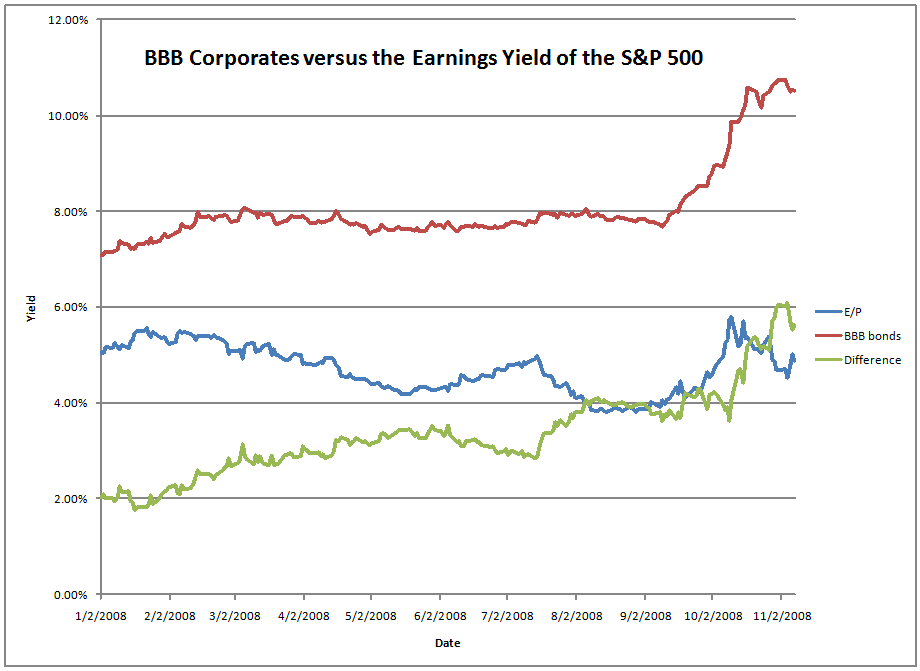I have lots of models, but I am only one person, so some of my models sit idle becuase I don’t have time to update them. Well, today, as I was reading Barron’s, I ran across the “Current Yield” column, and read this:
THE STOCK MARKET IS PRICED FOR a recession, but the bond market is priced for a depression. So says Rob Arnott, the brainiac who heads Research Affiliates, an institutional advisory.
That’s not hyperbole. Corporate bonds rated Baa or triple-B, the low end of investment grade by Moody’s and Standard & Poor’s designations, offer the biggest yield premium since the early 1930s, notes RBC Capital Markets.
That’s a problem for pulling the economy out of the credit crisis, but an opportunity for investors. Indeed, investment-grade corporates with near-record premiums arguably offer better return potential than common stocks, especially relative to their risks. “I haven’t seen this many markets offering double-digit opportunities since 1989-90 or ever so briefly in 2002,” says Arnott.
Part of it reflects the sheer weight of numbers. Corporates rated Baa yield about 550 basis points (5.5 percentage points) more than comparable Treasuries, nearly half again the spread in the 2002 post-WorldCom-Enron debacle and twice the average of post-war recessions.
You have to go back to the early 1930s, when Baa corporates yielded 700 basis points over Treasuries, to find a comparable situation. And notwithstanding all the hyperventilation in the media that this is worst financial crisis since the Great Depression, there’s never been such a full-court response to the threat of debt deflation — the $700 billion TARP, the bailout of Fannie Mae and Freddie Mac, the likelihood of trillion-dollar deficits and a doubling in the Federal Reserve’s balance sheet in just over two months.
I know things are bad in the corporate bond market, but I didn’t think it was that bad. This made me ask, “Hmm… what about my stocks versus bonds model?” That article is one of my better ones; a lot of time and effort got poured into that. So, I sat down and re-engineered the model, since, embarrassingly, the original model was lost.
The key question is whether the yield on BBB corporates is more than 3.9% higher than the earnings yield on the S&P 500. The answer is yes, and that means we should sell stocks and buy corporate bonds. But, here is the embarrassing thing for me. The first recent signal to sell stocks and buy bonds came in mid-August, but since I didn’t track the model regularly, I missed that. Since the original model worked off monthly data, even selling in early September would have preserved a lot of value. It is not as if corporate bonds have done well since August, but they have done much better than the S&P 500.
Here’s a graph summarizing 2008 via my model:
When the green line goes over 3.9%, it is time to buy corporate bonds. That is not a frequent occurrence; this model gives of signals only a few times per decade. Check out my original piece for more details.
So, with that, I offer my conclusions:
- It is still time to allocate money to corporate bonds versus equities. Where I have flexibility with my own money, I am allocating money away from Equity and to BBB investment grade and high yield corporates.
- Though there are a lot of reasons to worry, corporate yield spreads discount a lot of trouble.
- The model indicates a fair value of the S&P 500 at around 700. Uh, I’m not predicting that, but if we hang around at yield levels like this for long, yes, the equity market will adjust to the competition. More likely is the equity market treads water while corporates rally.
- A caveat I toss out is that all areas of the credit markets where the government is not meddling are disproportionately hurt, because investors are fleeing toward guaranteed areas. Thus, corporates are hurting.
- College endowments and other investors that hate to buy conventional assets should consider corporates now. It is my bet that a portfolio of low investment grade and junk grade corporates will outperform a 60/40 portfolio of Stocks and T-Notes.
- If you have the freedom to sell protection on a broad basket of corporates, this might be a good time to do it, when everyone else is scared to death. Time to insure corporate credit, perhaps.
- One more caveat before I am done. The rule has only been tested on data since 1953. It is not depression-proof. I hope to gather the data from that era and validate the formula, but that will be difficult.
So, be careful out there, and remember that corporate bonds typically do better than stocks in a prolonged bear market for credit. Yield levels like the present typically bode well for corporate bonds versus stocks.


No comments:
Post a Comment